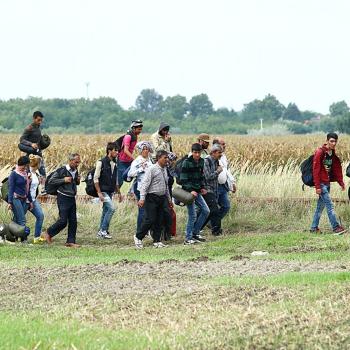The following is a guest blog post by Brandon Morgan, one of the organizers and leaders of the Void Collective. Brandon is a seminary student and participant in an emergent church who has attended various emergent church conferences and meetings.
Brandon’s guest post (unedited):
I just got back from a tiring drive to North Carolina where a group of my
friends and I performed an event at the Wild Goose Festival-a self-proclaimed
community combining the various impulses of art, justice and spirituality that
reside within Emergent and Progressive Euro-American Christianity. I have been
conversant with and engaged in the Emergent conversation for a few years now,
mostly dealing with the philosophical shifts within post-evangelical emergent
types. I have to say initially that I was raised in a Southern Baptist family
who were confessedly conservative politically and theologically. And because it
is vitally important that the terms "conservative" and "progressive" be defined
within a specific context, I will say that the conservative proclivity dominant
within my nascent Christian spiritual journey commonly held anti-gay, pro-life
views mixed with inerrant views of scripture and complimentarian views of gender
in family and ministry. This will sound familiar to most evangelicals, even
though many self-confessing evangelicals refute these views.
I generally have qualms with much of the political and theological conservatism
rampant within conservative evangelical circles. I don't feel, however, that i
have much at stake in the conversation about evangelicalism, its definition, its
life or death, and its connection to right-wing political policies. I do,
however, have a stake in the direction of the church in America and where the
Emergent folks fit in to that conversation. I have this stake because I am a
Christian in America and I am fairly conversant and sympathetic with Emergent
forms of American Christianity. For a while, I saw Emergents struggling to
recover from their fallout with fundamentalist Christianity. Emergents wanted to
be as socially engaged as some of the folks they saw in the Mainline
denominations. I am sympathetic with the concerns and criticisms of conservative
evangelicalism and the way this group so readily conflated Christianity with
right wing political agendas. The Emergent folks eventually wanted to become,
post-conservative, or post-evangelical in light of their fallout with the
conservatism in their evangelical past. This need to redefine the church in
America apart from conservative evangelicalism has sort of left the direction of
Emergent types up for grabs. They pledge to no center, institution or
affiliation. They have no infrastructure and no money. Their strive for
authenticity has lead to a number of attempts to reshape the church in America
(and across the pond as well) in ways that transcends the evangelical-mainline
divide. (I use "mainline" perhaps unhelpfully to describe denominations who
align themselves with left-wing political views and who find themselves within
an American form of the tradition of liberal theology begun in 17th century
Germany).
Upon returning from the Wild Goose festival, I felt that the festival was, among
others things, a blatant attempt to show how well Emergent folks and mainline
folks get along (particularly regarding the LGBTQ community) and how they
generally have the same enemies (conservative evangelicals). (Typologies are not
necessarily helpful, but they will have to do here). If Emergent folks initially
sought to bring together the evangelical emphases of conversion, scripture and
discipleship with the progressive emphases of social justice, inclusion, and
theologically progressive approaches to Christian doctrine (which, we must
admit, often amounts to a covert denial of many traditional forms of those
doctrines), then the question is: have Emergent folks succeeded in transcending
the evangelical-progressive division in American Protestantism. Have they
formulated a holistic theological approach able to include the benefits of both
sides and jettison the negative aspects? Some may question whether this is
actually the goal of Emergent folks. If this is not their goal, at least
peripherally, then my personal understanding of being involved with the Emergent
conversation is perhaps questionable. But more importantly, if this is not at
least a tertiary goal, then my question is: why haven't Emergent folks joined
the mainline denominations? Why have the negatives of evangelicalism been so
easy to describe and virulently rebuke, while the negatives of the mainline
denominations have barely shown up in Emergent concerns? Another way to ask this
question would be: Why hasn't the Emergent critique of evangelicalism's
involvement with the American nation-state and it's tendency toward creating
theologically exclusive boundaries not found root in a critique of Mainline
denominations, whose political interests also conflate the church with
nation-state interests? Yet another way to ask this question might be: Why do
post-liberals (e.g. The Ekklesia Project) look so different from liberals yet
nothing like evangelicals, while post-evangelical Emergents look alot like
liberals?
One reason for this is perhaps economic. Evangelical churches wont fund Emergent
projects and the Mainlines, who have been trying to recover from their downfall,
are willing to invest. But I sense economics is not the only issue. Another
issue is the inclusion of the LGBTQ community. Many Emergents unquestionably
advocate the way Mainlines have dealt with this issue, which is to see the
church as a tool for social justice in America whose goals, therefore, tend to
be ineradicably tied to the maneuverings and structures of the American
nation-state. While I have deeply sympathetic opinions about the LGBTQ community
and its relationship to the church, and while I also have my opinions about
economic investment in Emergent projects, my more fervent concern is to ask if
Emergent folks are really going to question the Mainline denominations'
political and theological liberalism in a similar way they criticize
evangelicalism's theological and political conservatism. If not, then its a
question whether or not Emergent folks have anything new to offer to American
Protestantism. If they do have something to offer, then perhaps it should be a
critique on the conflations of liberal freedom (aka pluralistic tolerance) and
Christian freedom in the Mainline church, or the attempt to manipulate
nation-state policy to fit with the vision of such freedom. Maybe it should be a
critique on conflating love with open tolerance to anyone, which eventually
leaves everyone affirmed as they are and no one converted. It could be the
failed attempt to reduce theological claims to social justice claims, which
forces us to ask exactly what the doctrines of the church, the Trinity, the
Incarnation and the Resurrection accomplish, other than pithy symbols used to
advance left-wing forms of American democracy. The critique could be the loss of
Christian uniqueness within American religious and political culture that
suffers from a spiritually amalgamate ethos that can be summarized by a phrase
made in Paul Knitter's Wild Goose talk: "I love Buddha and Jesus, but I still go
home to Jesus."
I don't necessarily mean to lay my censuring cards on the table about
Progressive Christianity in America (Notice, I critique conservatives too). I
just mean to say that if Emergent folks find themselves comfortable in Mainline
walls, particularly the walls of liberal pluralism dominant in both theological
and political aspects of American liberal protestantism, then I question what
new things the Emergent conversation has to offer. If they have something new to
say, then angst about a painful past with fundamentalism will need to produce
theologically fruitful reflections about the church that look different than a
recovery of mainline dominance in the early 20th century. Emergent folks will
have to start distinguishing themselves from progressive Christianity if they
want people to think that something new and important is really happening. They
will also have to start caring more about the theological and political space of
the church itself than they do about using the church to bolster American
nation-state policies. Simply put, emergent folks need some theological
sophistication that cultivates distinctiveness lest they seep into the
homogenized spirituality of progressive Christianity in America or find
themselves directly tied to the project, initially espoused by liberal
Christianity and copied by evangelical Christianity, of trying to use the
Christian church to control the history of American politics.















